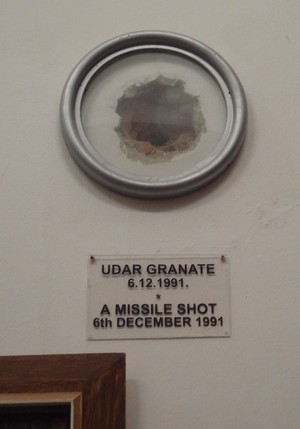Dr. Katheleen
Wilkes devoted her life to the victory of Croatia
Glas iz Dubrovnika / The Voice from Dubrovnik was a daily leaflet printed just on one A4 leaf (ie. two pages) that tried to follow the daily life and encourage the citizens of Dubrovnik to endure the dramatic events during the Serbian - Montenegrin siege of the City of Dubrovnik. Short articles published in the Voice from Dubrovnik are important testimonies, and among them especially interesting are those writen by dr. Kathy (Kathleen) Vaughan Wilkes from Great Britain. She lectured philosophy at the Inter-University Centre in Dubrovnik (IUC, since 1980), and at that time she was also the president of the IUC. The centre has been completely destroyed in 6 December 1991 during the Serbian bombing and shelling of the city, and its valuable library burned down to ashes. Subsequently Kathy Wilkes donated several thousand of her books in order to start restoring the libray of the IUC.
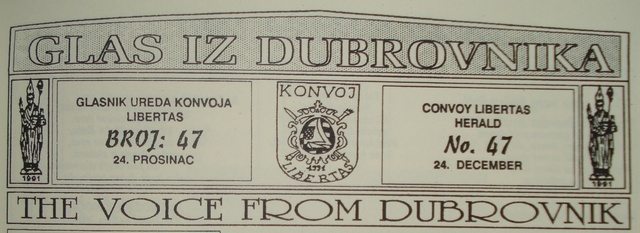
Each her article paublished in The Voice of Dubrovnik appears in two columns, in English and Croatian, on the first page of the leaflet. The dates above the articles refer to the dates of their publication. She spent four months in Dubrovnik during the most critical period of its destruction by the JNA ("Yugoslav People's Army", in fact Serbian army) forces. The Voice of Dubrovnik was distributed free of charge, and it existed from 8 November 1991 till 5 March 1992.
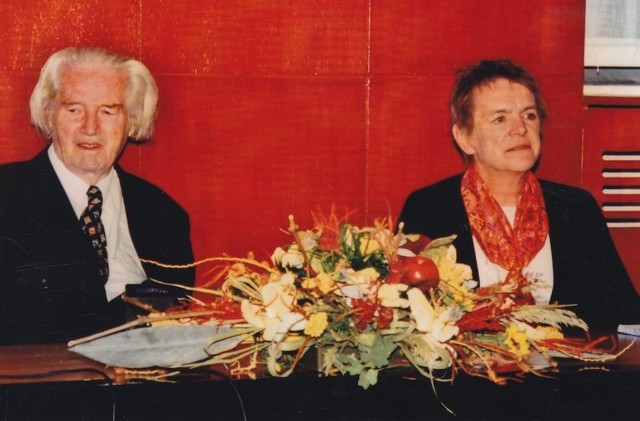
Ivan Supek, a founder of the Inter-University Centre (IUC), with dr. Kathy Wilkes in Dubrovnik.
Photo by the courtesy of Nada Bruer Ljubišić of the IUC, Dubrovnik.
Kathy Wilkes (1946-2003) has been affectionately nicknamed Kate (ka:te) by her friends in Croatia. She was proclaimed a honorable citzen of the City of Dubrovnik in 1993, awarded with the Hrvatska Danica (Croatian Morning Star) order from the Croatian Government in 1997, and with the honorary doctorate from the University of Zagreb in 2001. Dr. Wilkes died prematurely at the age of 57. According to her last wish, her ashes have been strewn over sea in the City of Dubrovnik.
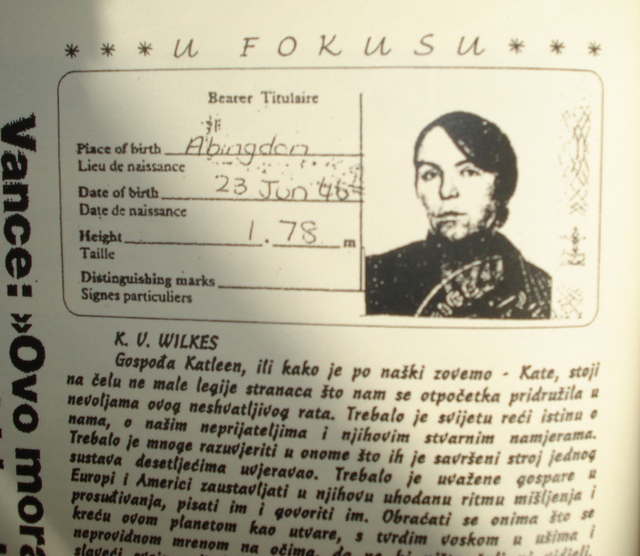
As described below the identity card of dr. Cathy Wilkes, she has been affectionally named Kate (ka:te).
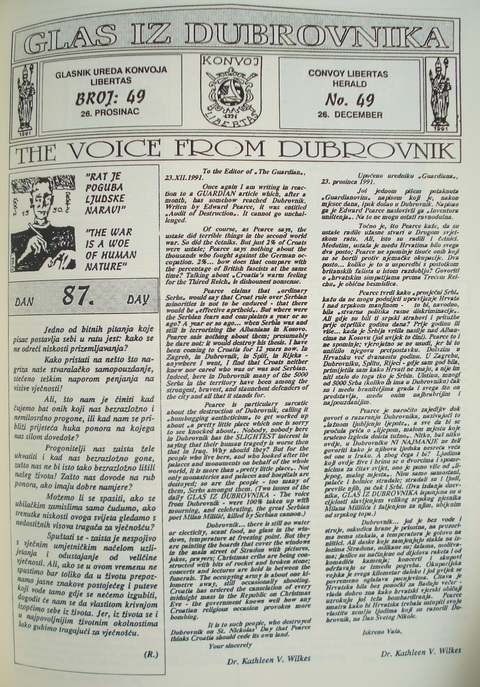
A front page The Voice From Dubrovnik leaflet, 26. prosinac [December] 1991.,
with English and Croatian columns of the text written by dr. Katheleen V. Wilkes.
A few explanations appearing in angular brackets - [ ] - within the texts written by dr. Kathy Wilkes have been added by Darko Žubrinić.
Shortenings:
JNA - Yugoslav People's Army, at the time of destruction of Dubrovnik and Vukovar without any control of the "Yugoslav government" in Belgrade, in fact Serbian army. By its military potential it was the third or fourth in Europe at that time.
IUC - Inter-University Centre in Dubrovnik
GLAS IZ DUBRONIKA / THE VOICE OF DUBROVNIK
9. studeni [November] 1991.
The editors of "Glas iz Dubrovnika" [Voice from Dubrovnik] have invited me to contribute regularly - daily, or perhaps every other day. I am honoured to be part of this publication, and will offer you comments from a "British friend of Dubrovnik".
Over the last few months I have grown to hate this word "velika" [great] when applied to countries. Besides, the British Government has been anything but "great" in EC [European Community] discussions about Croatia; I am deeply ashamed for my governemnt. (However, I hope that citizens of Dubrovnik will recognise that the attitude of the British government runs directly contrary to the desire of the vast majority of the British population, who cannot understand why Croatia is not recognised as a sovereign state [Croatia has already been politically recognised in 7th September 1991, by the Badinter Committee]. It is, obviously, bound to happen sooner or later... so why not sooner? Everyone is aghast at the way that the destruction of Croatia meanwhile continues, unchecked by the outside world).
Another comment suitable for an introductor contribution arises from talking to, and seing in action, the EC Monitors; both just recently, and in September/October. Their original brief was to mediate between two sides, between two arguments. There can no longer be any question of "two arguments". Indeed, the arrogance of the aggressor / the arrogance of brute force - is such that what we used to call the JNA [Yugoslav People's Army, in fact Serbian army] makes no attempt to explain, let alone to justify, this attack on a city of joy, of light, of culture. So the EC monitors, if they are to stay (and in some capacity they are needed) must change their terms of reference. Right now there is no point in them begin here unless it is to observe, and protest, the relentless bombing of civilian targets, and the cynical neglect of ceasefire agreements... which the army exploits simply to advance a few kilometers further into the city. And then complain when the Croatian forces try to halt them. The monitors could, for example, oversee the restoration of water and electricity to the city - possibly the aggressors might hesitate before bombing EC monitors directly. They should also register and report the attacks on churches, hospitals, cemeteries, civilian settlements; and, alomost the most tragic of all, the bombing of the refugees in the exposed tourist hotels.
On Wednesday, at an Inter-University Centre conference on the plight of refugees in Croatia, some participants were dissatisfied with the extent of the preparation for the defence and sustenance of the city. But what I have just said goes far to explain this: who could possibly expect or aniticpate such an all-out attack upon civilian targets?
This the centre of Europe; this is 1991.
The world has, rightly, not yet forgotten nor forgiven the allied bombing of Dresden in the Second World War - even though in that war the Germans were the aggressors. Those of us who used to be optimists had thought that such atrocities could not happen again, at lest not in Europe. But now we see a reverse to primitive barbarism.
More comments and impressions soon.
IUC: K.V. Wilkes
GLAS IZ DUBRONIKA / THE VOICE OF DUBROVNIK
11. studeni [November] 1991.
I write this on Friday afternoon. Like you all, I hear the bombs falling shaking even the Mayor's office, from where I write.
Not surprisingly, my thoughts this afternoon turn towards what we used to call the JNA [Yugoslav People's Army, in fact Serbain army]. Three comments that provoke bitter smiles.
First: did you know that on 31th July [1991] there was a complaint made against Federal Army planes for flying low over the city; it was thought vibrations from the flight might damage the fabric of the city. Vibrations from the flight!
Second: only a very few months ago, when listening to lectures in the Inter-University Centre, I used to curse the siren-salutes with which the navy as it passed greeted the great maritime city of Dubrovnik. Those salutes seriously disrupted the lectures... but now the "salutes" are of a wholly different order, a gunboat has been bombing Srđ [imposing hill above the city] today.
Third: I remember how when I left Dubrovnik in mid-October [1991] on "Slavija" [ferry], a gunboat stopped us just after we had left Split. It went round and around the ferry, but always with the cannon pointing at it. Then, presumably to impress us thoroughly, it went right around the Slavija backwards (incidently soaking all the sailors on board). This struck me as a symbol of contemporary Serbia: going backwards while the rest of Europe goes forwards. And, to judge from the bombing of churches, hospitals, synagogues, cemeteries, housing settlements, ambulances... going backwards not just to unreformed communism, but to something less than human.
As I write, the bombs continue to fall: every Croatian port is blockaded; the sirens have gone again in Zagreb, as here. But Serbia is going backwards while Croatia is struggling forwards; even, today in Dubrovnik - planning concerts, dances, plays, recitals... keeping the spirit of the city alive.
That is whay in the long run you (can I say "we?") will win; but in how long a run, and at what further cost?
I shall content myself with these brief comments today, because I expect that the editors will need space for basic information and advice.
IUC: K.V. Wilkes
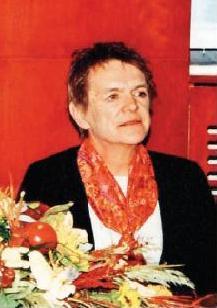
Dr. Kathy Wilkes (1946-2003) in Dubrovnik,
honorary citzien of the City
since 1993.
She died in Oxford, and according to her last wish, her ashes have been
strewn over sea near the City of Dubrovnik.
GLAS IZ DUBRONIKA / THE VOICE OF DUBROVNIK
12. studeni [November] 1991.
Today I shall remeber that I am by rofession a philosopher, and will brood over this word "negotiate".
I have much sympathy for the Dubrovnik who - when they can - travel, at considerable personal risk, to negotiate with the local [Yugoslav, in fact Serbian] army commanders. Now "negotiate" is a word that implies that there are two tenable positions, two arguments, two sides each or which deserves to be heard. So just what can be the army "case", the army "argument? How do the army negotiators explain the reason for depriving the city of food and many of the tourist hotels - refugees in so many of the tourist hotels - refugees whom they have already bombed out of their villages? What case an army negotiator have for bombing the gynaecological ward of the Medical Centre; the Bishop's Palace; for fire-bombing Lokrum [islet in front Dubrovnik covered with old pine trees] and the few remaining trees on Srđ [hill above Dubrovnik] ... and you can all continue the list?
I thus find my imagination failing me when I try to envisage the course of these "negotiations"; whether it is the Dubrovnik negotiators attempting to talk to the army, or the EC monitors. I am baffled by a very simple question: just what do the army negotiators say? Yesterday there should have been another meeting of the negotiators. But the army made it impossible - far too dangerous - to travel, and so the meeting was cancelled. And yet it was yesterday - Sunday - that, according to the latest Carrington plan (signed by Government and army) the army must start pull out of Croatia. Instead, we received 3.000 granades.
This point can be generalized. We have all grown used the cynical flouting, by the army, of each and every agreement and cease-fire. Now, apparently, the local commanders are even disregarding an agreement signed by Kadijević, their commander-in-chief. But I fear that Kadijević and Milošević will not complain about this breach of military regulations, this insubordination. Kadijević and Milošević, after all, have set the example of ignoring and mocking agreements brokered in the Hague. So what do, what can, they say, when challenged by Carrington or other foreign leaders? Again, my imagination boggles. Talking, even with people as difficult as these two, is of course better than being forced to fight them; but Dubrovnik - and the whole of Croatia - is being Hague let Kadijević and Milošević get away with this. "Negotiate"; a good word, now being cruelly and cynically abused.
IUC: K.V: Wilkes
Štovani čitatelji!
Ovo su stvarno najgori dani u povijesti Dubrovnika. Naši prevoditelji već danima ne izlaze iz skloništa, što nam stvara teškoće, pa preostaje da objavljujemo samo izvorne tekstove. Kada prevoditelji ugledaju svjetlo dana ugledat će ih i prijevodi.
Vaš novi sugrađanin: prof. Alojzije Prosoli
GLAS IZ DUBRONIKA / THE VOICE OF DUBROVNIK
15 studeni [November] 1991.
George Bernard Shaw wrote: "If you are looking for heavn on earth, come and see Dubrovnik".
My friends: you - we - have been going through hell here, especially over the last few days. It is difficult to see how this nightmare, this inexplicable and inexcusable asault, could have been worse. And today is the 44th day of steadily increasing danger, destructions, illnesses, shortages. Your courage and resilience constantly amaze me. My theme, today, is the central role of the people: the man and woman in the street.
But I shall come to that theme circuitously. For a long time now, and despite repeated disappointments, I have remained optimistic that the outside world (especially Europe, or the USA) would eventually offer more than mere words - words deploring the attack upon this great city. Now, because the Old Citiy itself has been strongly bombed, I am becoming more hopeful of more solid and constructive intervention from outside.
It would, though, be bitter and tragic to discover that it takes an attack upon stones and palaces, rather than on people's lives, to galvanise into action the world outside. But if that is the way it has to be - so bi it. The end is so important that almost any means to it would serve. But it would be an unpleasant discovery to make about the priorities of world leaders.
The Mayor has today invited Presidents, Prime Ministers and Foreign Ministers of the EC countries to come to Dubrovnik to see for themselves the devastation wrought upon this city. He and (indepdendently) the city's religious leaders have also invited Lord Carrington here. And further, a letter has been sent out on your behalf, from "citizens of Dubrovnik", to ordinary citizens in towns and cities throughout Europe. This letters invite them to demand that their authorities make their town and cities "twin towns" with Dubrovnik. If Dubrovnik were "twinned" with a large number of European towns and cities... then perhaps those citizens, people like yourselves, might prove to have more integrity than their political masters; and do something constructive to help this city.
As always, the suffering is borne by the man and woman in the street; perhaps such people, elsewhere in Europe, will take some of the responsibility for reconstruction, protection, rebuilding.
IUC K.V. Wilkes
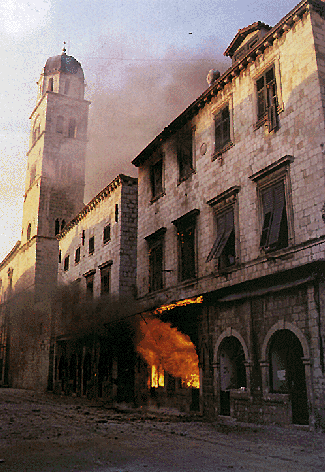
Stradun street in Dubrovnik, one of the most beautiful strets in the
world,
after Serbian bombing.
GLAS IZ DUBRONIKA / THE VOICE OF DUBROVNIK
18. studeni [November] 1991.
This is my first war (I was born just after the Second World War [1946]). It is not at all what I expected - and not only because of the truly astonishing extent of the atttack against purely civilian targets. I suppose that I had half - expected a war to involve continuous, even frantic, activity. Well, there is of course some of that; and in fact activity makes everything easier to bear, even if the achievement brings no more result thatn spitting into the wind. Hardest to indure is doing nothing, nothing but listen: listening to the mortars falling, listening to the stories of those to have lost relatives, neighbours, their homes, cars, boats. Listening, waiting; that, my friends, demands all of your courage. A less dramatic kind of courage than that of the defenders of this city, but a real endurance nontheless.
Quite another sort of courage will be needed afterwards. Several thousands must return; people must resettle, rebuild, repair. And not just repair structures and possessions, but also relationships. Whatever the atrocities perpetrated upon Croatia in general and Dubrovnik in particular, it is impossible to pick up the country and move it elsewhere. Serbia and Montenegro will remain neighbours. It will take every last drop of the internationalism for which Dubrovnik has for so long been famous, to repair relationship there. But, somehow, it will have to be done.
Relationships with the rest of Europe, and with North America, will also need reshaping and rethinking. When contrasted with the hospitality with which you have welcomed so many thousands of thousands of them, the inability or unwillingness of the EC [European Community] and the USA to take any constructive action is truly shameful. Shameful, too, was the pretence - only quite recently abandoned - that in this aggression against Croatia both sides were equally to blame: self - defence equated with attack. But, again, Dubrovnik needs its tourists; and so bitterness against the world outside, however understandable, would be counter - productive.
As you can see, I have allowed these two days of relative quiet to encourage me to play in my imagination with the period "after the war". Anything is better than the rockets and bombs. But the demands on your courage and patience will continue long after this is over.
K. V. Wilkes, IUC. 15 November 1991.
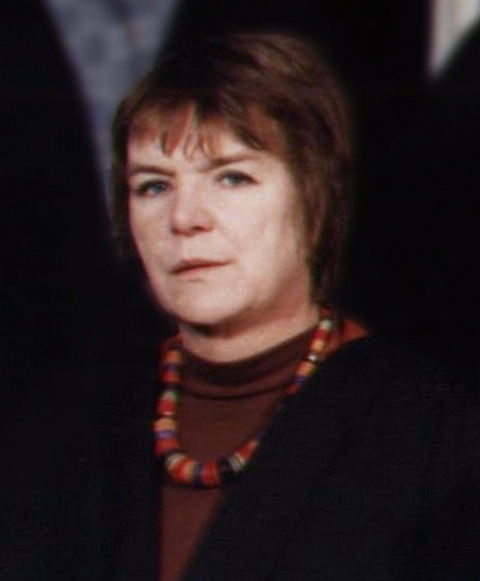
Dr. Kathy Wilkes, professor of philosophy at Oxford University and Inter-University Centre (IUC) in Dubrovnik.
Photo (earlier version) by the courtesy of Nada Bruer Ljubišić of the IUC, Dubrovnik.
This photo by the courtesy of the Principal and Fellows of St Hilda's College, Oxford;
many thanks to Mrs Elizabeth Boardman, Archivist (received on 31st January 2014).
GLAS IZ DUBRONIKA / THE VOICE OF DUBROVNIK
23. studeni [November] 1991
My friends: the British media, and letters to the British papers, are increasingly more and more sympathetic to Croatia, and outraged by the attacks on Croatia in general and Dubrovnik in particular. But there are occasional exceptions; and yesterday a friend in London faxed me a copy of a letter, published in The Times, from Miss Nora Beloff. She has long been known in Britain as a "Yugoslav expert"; but, I fear, has spent far more time in Serbia than in Croatia. Her letter infuriated me; and so I thought that for this day's piece I would give you a copy of the letter I sent to The Times in reply. (I have adjusted it here and there, to make it clearer to those who can't have seen Beloff's letter.)
I is not easy to get The Times in Dubrovnik and it was only yesterday that a friend faxed me a page of it containing a letter from Miss Nora Beloff. She says that 'extremests dedicated to ridding Croatia of Serbs' are now 'learning the hard way, unfortunately at the expense of all lovers of Dubrovnik'. I am not; with some honourable exceptions they have done nothing to express this 'love'. My concern is with those living here; the 6% of Serbs and the 90% of Croatians. The snipers and the bombs do not discriminate between them - one of the early deaths from Serbian cannon was the great Serbian poet Milan Milšić. (Now he was a real 'lover of Dubrovnik'.) The shortage of food and water does not discriminate between them either. And Dubrovnk has no minoriy enclaves, and no history of Serb-Croat violence. One example, of the dozens available, would show better the virulence of the attack on everyone living here - regardless of race or raligion - than any list of blasted hospitals, ambulances, monasteries. 13000 refugees were bombed in to the city from the surrounding region. Almost 9000 of them have been sheltering in the formerly-tourist hotels. Who knows or cares whether they are Serb or Croat? Not the bombs. They have been shelled again, again, and again. They live, or try to live, behind the flying glass of large picture-windows; and have nowhere else to flee. Miss Beloff is right to say that flags and emblems identify this city as Croatian. It is, after all, Croatian. And it is as well a fully international city. The point is, Miss Belfof, that Croatia is indeed a dangerous animal: when attacked, it defends itself.
Yours sincerely,
dr. K. V. Wilkes
K. V. Wilkes, IUC
GLAS IZ DUBRONIKA / THE VOICE OF DUBROVNIK
24. studeni [November] 1991.
In my last piece for Glasnik iz Dubrovnik [The Voice from Dubrovnik], I was writing about the eventual need for reconciliation. Today I wasn't to do something almost diametrically opposed to that: to give, in descending order, to list of the contemptible.
Head of my list must come the snipers. It is impossible to imagine anything more cowardly, more alien to all that makes the human spirit human. Snipers are not 'animals'; that would be grossly unfair to animals. Shooting at random at civilians in the streets.... this sickens the soul.
Nex come the looters. These are the leeches of the community; exploiting loss and misery. From those who already have their homes and possessions devastated they steal what little is left. Again, less than human.
Next: those who give the orders to bomb churches, hospitals, monasteries, ambulances, the fire station, the hydroelectric plant, so much civilian housing - all that is essential for civilian life. It is a long time, in the history of European warfare, that the civilian infrastructure has been this singled-out for attack.
Fourth, of course, those who carry out those orders. What goes through their minds, when they obey an order (heard, and taped, by radio amateurs) to "shoot the churches"? Admittedly, it takes a special kind of the courage to refuse an order from a commanding officer, and back in July General Adžić said in a speech that those who refuse to fight "must be shot without mercy and without regret". But the defence that he was "obeying orders" did not help Lieutenant Calley in the Vietnam War; one of my uncles was court-martialled and imprisoned during the Second World War, for refusing to fire on a village which he thought was defenceless.
Fifth: those Serb and Montenegrin civilians who lie low and say nathing; who are not rasing their voices in horrified protest against what their leaders and army are doing to Croatia. Increasingly, braver Serbs and Montenegrans are speaking out, but not yet enough; it does not, after all, take much courage.
And finally, politicians in the world beyond; who for far too long have merey said "tut, tut"; who have talked of sanctions "against Yugoslavia"; who throw words at Croatia when food, water, itervention are what are needed. Have I left out anyone?
K.V.Wilkes, IUC
The map
of Serbian bombing raids on Dubrovnik in 1991
GLAS IZ DUBRONIKA / THE VOICE OF DUBROVNIK
25. studeni [November] 1991.
Dubrovnik: city of contrasts and paradoxes. A city of light and of sun, movement and colour; now black or dark gray at night, motionless after 9.00 p.m. A city of famous fountains, starved of water. A city that has for centuries been a centre of culture and international civilization, now rarely able even to telephone. A theatre for the world, now a theatre of war. A city trying to shelter thousands of refugees, but seeeing almost the same number leaving to shelter elsewhere. A route between Dubrovnik and Rijeka... via Zelenika. A city "protected" by the Hague Convention Spomenik Kulture flags [flags of the Munuments of Culture], one of which has a bomb-blast through the exact centre. An international and unviersial city, assalted viciously by its immediate neighbours. With no history of ethnic violence, but now right in the middle of an ethnic assault. A commune with no military installations treated as though it were an army camp. Relief ships that bring food for the children, the sick, and the elderly... and taking away to elsewhere same people. The navy, "greeting" the city with bombs and blokades, when it used to salute it with sirens. A maritime city, prevented even from sending fishing-boats out. Self-defence treated by a large part of the international community as though it were on a par with aggression. A city of gold adn lead.
K.V. Wilkes
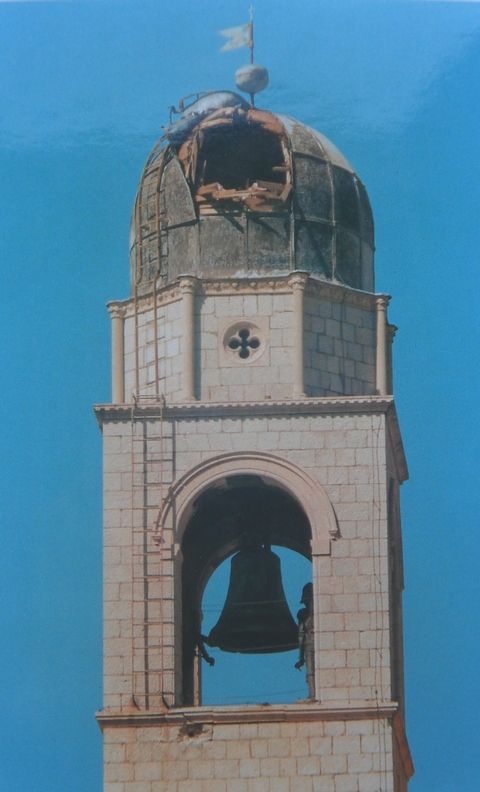
City bell-tower in Dubrovnik, on the main street of Stradun, a monumnet of culture,
shot in 1991 during the Serbian agreesion on Croatia.
GLAS IZ DUBRONIKA / THE VOICE OF DUBROVNIK
30. studeni [November] 1991.
On 29th (day 59) [day 59 of the Serbain and Montenegrin siege of the City] we saw three bright UNESCO flags flying above the Old City: blue, like Dubrovnik's sea and sky, and white, like its stones. Many will be asking whether they will give greater protection than the "Spomenik kulture" flag [Monument of culture flag] of the Hague Convention. These often seemed to provide targets for the army rather than defence from it; I mentioned, in an earlier piece, the "Spomenik kulture" flag in Rijeka dubrovačka with a rocket hole in its exact centre.
Well: UNESCO is UNESCO. It should take an even greater degree of barbarity, contempt for world opinion, and recklessness about the likelihood of international intervention, to fire on places thus protected than on buildings and monuments protected by the flag of the Hague Convention. Yugoslavia (as it then was) signed the UNESCO "Convention Concerning the Protection of the World Cultural and Natural Heritage". The convention has a "World Heritage Committee", which draws up a list of sites and monuments (selected from those proposed for inclusion by member countries), choosing those which it considers part of the world's natural and cultural heritage. Sites and monuments thus included are - I quote from the introduction to UNESCO's 1982 [misprinted 1992] desk diary - "considered to be of such exceptional interest and universal value that their protection is the reponsibility of all mankind"; and "on signing the Convention each country pledges to conserve the sites and monuments" (are you listening, Belgrade? You proposed Dubrovnik for inclusion). "In return the international community helps them protect these marvels".
Simply being on UNESCO's list, though, has not helped Dubrovnik so far; nor Split, nor Plitivce [lakes] (also listed). But perhaps the flags, and the presence of two UNESCO representatives, who will report daily to the Paris headquarters and who, before they leave, will set up a permanent office here, might bring home to the aggressors the mindless barbarity of what they have already done. It was splended to hear, at the press conference, that the concern of the UNESCO pair is not only with Dubrovnik's heritage itself, but also with those who preserve, inhabit, and continue this living heritage. Thus the whole city, not just the Old City, has become UNESCO's concern.
Many have asked why UNESCO (and other international organizations) were not here far, far sooner. We heard much of the reason at the press conference: this is the VERY FIRST TIME tha UNESCO has ever sent a mission to a region in a state of war. Such a major switch of policy cannot be made overnight; bureaucracy, and especialy international bureaucracy, always works slowly.
Internation action more generally is lumbering around, steadily, to understanding the reality of the situation. (A I was typing this, of Friday morning, the text of a UN Security Council Resoluton came over the fax; the contents of the Resolution are promising.) And it is starting to understand not only the threat to Dubrovnik; even though the fame of Dubrovnik may have made more vivid, to the outside world, the agony of the Croatia to which it belongs.
K.V. Wilkes
GLAS IZ DUBRONIKA / THE VOICE OF DUBROVNIK
4. prosinac [December] 1991.
There is a proposal - and I do not know at the moment what will become of it - to send some of Dubrovnik's museum pieces (roughly, objects of art that are portable) on an exhbition-tour of some European countries; most likely, Italy, Britain, France. Along with such tersures would go an exhibition of Dubrovnik's war; pieces of rocket and mortar, bits of shattered stone, videos of the bombing, and the photographic record of the destruction. The exhibition would be called "Dubrovnik: city of Gold and of Lead".
Many popele, I gather, are understandably upset, or at least feel ambivalent, about this idea. They know how much Dubrovnik has ALREADY lost; must it also lose, even temporarily, some of the art treasures that belong to its heritage? It is bad engough to lose so many people (and, to speak only for myself, I was grieved to hear those organizing the "humanitarian corridor" publicly ENCOURAING more women, children, and the elderly to leave); is Dubrovnik also to be stripped of much of its artistic, as well as its human, richness?
However, I suggest that this is a time to think positively and practically. Practically: these objects would be safe, protected. We have all heard how the army sweeps through towns and villages like locusts, devouring and looting anything they can carry or put in their lorries. Heaven alone knows how much of its heritage Croatia has already had stolen-away from it, burned, or bombed to destruction. The day before I wrote this (I do not know when, or if, this will be published) was the day the army was trying to destroy the cross at the top of [the hill of] Srđ; that shows better than anything the army attitude towards objects that have religious aesthetic, cultural, or historical importance.
Positively: such an exhibition would give those who saw it a double shock. First, the shock of seeing the grandeur and the beauty of the artefacts that have come from the City of Dubrovnik. Second, the shock of seeing the evidence of the brutality of that attack.
Nobody, I imagine, would object to a travelling exhibition which both celebrated the glories of Dubrvonik and drew attention of its destruction - IF we were at peace. After all, I suppose that everyone was proud to see that magnificent exhibition, "The Golden Age of Dubrovnik" travel outside the city. It is the loss of yet another strand in the web of Dubrovnik's identity just NOW: it is that which hurts.
Well: it may never heppen. But believe me, my friends, I sympthise most fully with your unhappiness about the idea.
K.V. Wilkes, IUC, 3. XII. 1991.
GLAS IZ DUBRONIKA / THE VOICE OF DUBROVNIK
5. prosinac [December] 1991.
Let us have, for a change, a piece that has NOTHING to do with our crisis situation.
I am trying to learn Croatian, Your langague is not easy, my firneds; I have been trying, on and off, for quite a while now. Moreover, my memory would make a sieve, by comparison, seem like a watertight container. How much easier it was to learn languages when young! The Latin, Greek and (little) French which I learned at school are with me still - the Greek the best, since I have to use in my work.
One problem for my attempts to learn Croaian is the Inter-University Centre itself, where (until recently) I spend practically all my time when in Dubrovnik. Almost everyone in the Secretariat seems to have fluent English, not to mention French, German or Italian. So, when working at the IUC, there is rarely any need to try to speak Croatian; all that is needed is the very basic linguistic equipment required fro shopping, travelling, etc. Another problem is that I am lazy.
But ah, the shame of it! I say, truthfully, that I have been coming here for twelve years now. So there is really no excuse. And, because of twelve years I have made many good friends, I get invited to their homes... and there meet their parents or children, or their friends, who perhaps do not speak English; and all I have is baby-talk. There is also the absurdity of asking "gdje?" [where?], or "zašto?" [why?], and not understanding the answer.
It is a pitty, though, that the recent increments to my vocabulary have been such words as "rat" [war] , "žbuka" [mortar], "raketa" [rocket], "snajper" [sniper], "rana" [wound], "bombardirti" [to bomb], "sklonište" [shelter], "blokada" [blockade], "napad" [attack]. (You see now, even in this piece, the war creeps back into the subject?) Next time you see me, speak to me SLOWLY, in simple Croatian; and be prepared to switch to English. I'll get there somehow, eventually.
K.V. Wilkes, IUC
GLAS IZ DUBRONIKA / THE VOICE FROM DUBROVNIK
7. prosinac [December] 1991.
Listen to us ... We appeal to all good people of the world, all good people of Croatia, Italy, France, the whole Europe, to all the sea captains, This is your moment. Dubrovnik needs help. Turn your ships and start towards Dubrovnik, Don't let the criminals to stop you, Ignore them. All the people who trust in Red Cross start for Dubrovnik because they [Serbain army] demolished International Red Cross headquarters; to you who trust in the idea of water becasue the oldest well in Europe is destroyed; to you who trust in health becuse the pharmacy is pulled down. To all who have any faith or religion, who are Orthodox, Catholic, Moslems, Jews start towards Dubrovnik. Oppose to the monster which has never been seen yet. Ignore that proper tiger, that monster of evil which does not deserve to exist. All of you who are the soldiers of the monster say that you are never again ready to work for the curse, that you will never listen to the unhuman. Dubrovnik sends you Gundulić's message of freedom, offers you the last chance. Run away from the criminals, from those who, even today after they did this to Dubrovnik, they tell they did not know. Reject the Nazi successors, reject those who set Dubrovnik aflame like the ovens of Auschwity, who burn the citizens of Dubrovnik like those in concentration camps in Germany. Reject Hitler's successors. Tell them - enought, and tell them - NE! Dr. Slobodan Lang |
Listen to us ... Serbia will never recover from this. Croatia - Dubrovnik - will take a very long time to recover, but recover they will. Serbia, however, has an indelible stain on its flag, its honour. This culmination of its attack on Croatia will go down in history as a crime with few parallels; Serbia has been accused, tried, and found guilty by every democratic country in the world. The sentence should be heavy: war reparations on a massive scale, trials for war crimes. Nor should the wider world quickly forget its shame. It is reacting now; but too late; too late to do more than help to pick up the pieces. What it MUST do, now that International outrage will compel action, is to come with force, come with relief, come with funds. Later it must enforce war reparations upon Serbia, and bring before an international court those accused of war crimes. What Serbians must do - the only thing they CAN do, to retrieve a fraction of their integrity - or to rise up in fury to overthrow the government that perpetrated such criminal acts in their name. Did it take attacks upon the buildings and monuments of the Old City, rather than the devastation in Mokošica, Župa Dubrovačka, Gruž, Lapad - not to mention Dubrovnik, Osijek, and so very many more - to awaken world reaction? Yes my friends, I fear it did. I must now sign this from the Skupština Općine; what remains of the Inter-University Centre is now a shell, still burning as I write this on the morning 7th November [1991, see below]. But, like a phoenix, the IUC will rise again. Along with the City of Dubrovnik. K.V. Wilkes, Skupština općine [Municipality council] |
BLACK FRIDAY [6 December 1991]
The balance of the black friday: 19 dead and 60 wounded, mostly civilians - according to uncompleted facts. How many houses are pulled down o rburnt, how many destroyed or damaged cultural monumnets - these are all the facts to be seen yet. At the moment, we can only say for sure the picture of destroyed city is frightening.
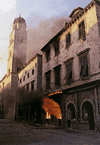
Barbarian
rhapsody
(from
the presentation by prof.dr. Enver
Sehovic,
University of
Zagreb)

![]()
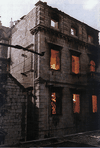
![]()

1991 Greter Serbian bombing and shelling of Dubrovnik
A missile shot in December 6 1991 to the convent of Minor Brothers in Dubrovnik. This convent only was hit with 50 (fifty) direct granade hits during the Serbain agression, causing a lots of damage on this top monument of Croatian culture. The hall hit by the granade is precisely the place where the oldest European pharmacy working continuously to these days was founded in 1317.
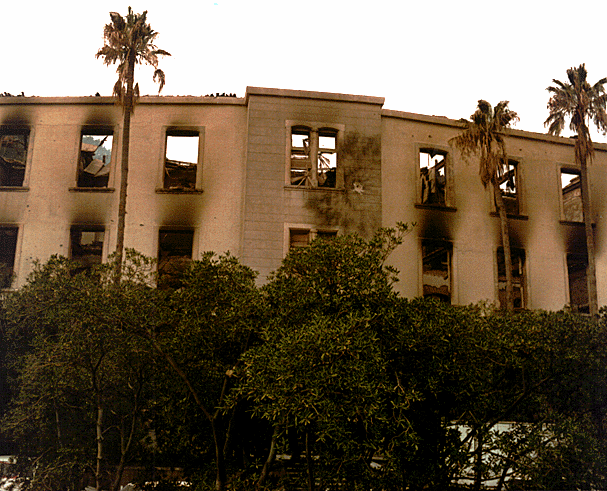
Inter-University Center in Dubrovnik after Serbian bombing in 6
December 1991.
Its very valuable library was set afflame and dissappeared in ashes.
Dr. Wilkes donated several thousads of books from her own library in
Oxford, to start the new library.
GLAS IZ DUBRONIKA / THE VOICE FROM DUBROVNIK
10. prosinac [December] 1991.
The little things, the things that don't hit the headlines. People as they stand talking, frequently putting thumbs in wastbands to hitch up trousers and skirts that have become too big. The delight with which we sometimes hear water gurgling, brifely, into the system. The astonishement of friends in Zagreb to hear that one CAN wash, all over, in half a litre of cold water, in December. The music [of Serbian aggression] from Žarkovitsa. The names of the two American senators who have been most helpful: Gore and Dole. People who have finished their last candle going to bed at 4.30 p.m. Hearing that the Serbian media had reported that CROATIAN forces had bombed Dubrovnik (with rockets from the sea, and wire guided missiles?) A map of Europe on the wall of a flat that was bombed... the map intact except for a hole where the city of Dubrovnik used to be. The control at Zelenica stealing gas cylinders sent to Dubrovnik from Rijeka and Split, and then to people in Cavtat and Mokošica. People wearing thick coats indoors. The surprise of a freign journalist when nobody in the Skupština Općine jumped around in excitement, or even interrupted their conversations, when shooting and bombing started again on devastated [hill of] Srđ. Driving along Stradun; driving with no lights at night; driving the wrong way up one way streets. The smell of burning cofee warehouse in Gruž [Dubrovnik port]. The bruises from tripping over, or bumping into, things in the dark. The population distribution in the city giving a new meaning to the phrase of male domination. The Old City at night - black, motionless. The small children with grey hair after two and a half months in shelters in Vukovar but no, no; that is a BIG thing. So is the recrucified Christ on the crucifix from Mokošica.
Personally? Wondering whether I shall ever want to eat spaghetti again, after the war. Discovering how much better that spaghetti tastes than the inapppropriately rich meals on occasional visits to hotel Argentina. Finding myself saying something favourable about Mrs. Thatcher. Learning to drink tea and coffee even if sugared. Learning the real meaning of friendship.
K.V. Wilkes, IUC 4. XII 1991. g.
GLAS IZ DUBRONIKA / THE VOICE FROM DUBROVNIK
11. prosinac [December] 1991.
AN OPEN LETTER TO CONVOY II
Dear friends,
I am taking the privilege of being an outsider - a British guest in Dubrovnik - to write to ask you a question which some people in Dubrovnik may be wondering, but which they are too polite to ask.
My question, put very bluntly, is just: WHY are you here?
Of course, some of the Convoy are people returning home. Others are those who want to see friends, who also want to see them. My question does not apply to these.
For the rest of voyagers: please do not reply that you are here to "show solidarity" with Dubrovnik, or to help to publicise its plight after more than two months of siege and assault. Dubrovnik citizens have the right to take for granted "solidarity" from the rest of the county of which it is a part; if it needs a convoy to prove THAT, then Croatia is worse-off then I thought. As for publicity: here the boot is on the other foot entirely. It is largely because of the publicity generated by the attack upon this international city - known and loved throughout the world - that the outside world, late but at last, started to react; and, late but at last, the rest of Croatia is beginning to reap some benefits. So it is in large part because of Dubrovnik's solidarity with you, and the way in which the agony of Dubrovnik publicised the agony of Croatia, that there seems to be some light at the end of this dark tunnel.
Do not come, please, to give them more words. I should explain that. Dubrovnik's war has been unique, as far as I can see. There was - is - a classic, textbook, military defensive war. It held all the ingredients known throughtout history when a vastly superior force assaults a territory and besieges a city. Skirmishes, bombing; small arms against wire-guided missiles, jets and naval shelling; small fast boats running the blockade at night... it was all there. Some who - God alone knows how - their outnumbered and outgunned force gave the city more than two months in which to prepare and put into acction its own assault.
Dubrovnik's own attack exploited all of its wealth of civlilization and humanism. For two months it worked with its own weapons: the weapons of its history. There were "negotiations", somehow, with an army command incapable of explaining WHY they were attacking the municipality: words, arguments. Dubrovnik exploited the techniques of more than civilization - phones, faxes, local, Croatian, and international media - to get across to all the vital importance of the values for which it stood; while the aggressors bombed churches and hospitals. Words, arguments, reasons. Dubrovnik's way of aiding morale was to hold Mozart concerts; while the assailants tried to destroy morale with discordant music blasted fortissimo from Žarkovica.
No, not more words; not more talk about the values for which Dubrovnik stands. You cannot possibly say anything that has not yet been said a thousand times on every street corner, later repeated by foreign dignitaries in "intellectual forums", and already agreed, endorsed and underlined in mass media throughout Croatia and the world. Please do not AGAIN tell the people of Dubrovnik that they already know better than enyone else.
A living heritage has to have living people to preserve and continue it. The best reason for "Convoy II" is to bring material aid: food, medicines, gass cylinders. The glare of the publicity generated by the bombing of palaces has thrown into the shade the less dramatic tragedy of malnourished children and old people with no hot food, shivering at night behind shattered windows. You will be welcomed in any case, of course; but "Convoy II" should not be coming just to accept the city's hospitality.
K.V. Wilkes
GLAS IZ DUBROVNIKA / THE VOICE FROM DUBROVNIK
13. prosinac [December] 1991.
History carries within it both "the balck wings of tragedy and the song of human hope" (Stephan Zweig). Croatia knows this.
This is a unique moment in European - indeed world - history. For the first tiem the democratic principle has almost universal acceptance ("almost", because we all know one of the exceptions). The speed and completeness with autocratic governements collapsed right across central and eastern Europe - proving that totalitarian regimes, however unshakeable they may seem, have feet of clay - caught the rest of Europe by surprise, totally unprepared. With the collapse, though, came peace. Democracy is seen to be the fundamental precondition for lasting peace, and the baest, maybe the only, guarantee of international stablility. It is authoritarian regimes that threaten peace.
But transition to democracy from monolithic or totalitarian system are difficult, even without a war. Democracies are fragile and complex. It si not "natural" for a society to turn to democracy as it is natural for rivers to run to the sea. When any ideology collapses suddenly, it leaves a gaping chasm; this chasm has to be filled by values and principles that may be unfamiliar to many, and by political and civic institutions not known in the community before. All this while reforming the economy to meet people's demands. To comlicate matters further, the speed with which the old collapsed fosters an understandable but impossible expectation that the new can be established with the same rapidity. The quest - as we see from other countries in Central Europe - is often hesitant, confused, slow.
Moreover, there is not, and should not be, any single pattern or model for democracy. Each community has its own unique specificity and diversity, its own rich texture in the fabric of its culture. So there is no "recipe for reconstruction", and decmocracies will all be different - for they have the blessed ability to agree to disagree.
Then, one achieved, democracy is still fragile, easily lost, easily corrupted, reversible. Maintaining it irequires an indefinnitely prolonged struggle. Indeed, many of the "established" democracies have lost much of their original power and success because of an apathy that takes democracy for granted as something that is just "there".
Responsibility and imagination; there are always needed. One of the values that must be common to ALL democratic systems, however great their differences, is the tolerance of diversity. Indeed, diversity is what makes democracies three-dimensional, and its absence what makes totalitarian regimes two-dimensional: the greatest democracies are those that express a kaleidoscope of many different cultures and civilisations. No democracy is, or should be, homogeneous, whether in race, religion, or culture. It is tolerance of diversity that enables some democracies to come closer to the goal of combining membership of a community with individual liberty.
What democracies do NOT need to tolerate, though, in intolerance: the ideology expressed in totalitarianism. This is just one of the reasons why Croatia and Slovenia were right to seek independence.
K.V. Wilkes.
GLAS IZ DUBRONIKA / THE VOICE FROM DUBROVNIK
26. prosinac [December] 1991.
To the Editor of "The Guardian", 23. XII. 1991.
Once again I am writing a reaction to a GUARDIAN article which, after a month, has somwhow reached Dubrovnik. Written by Edward Pearce, it was entitled "Audit of Destruction". It cannot go unchallenged.
Of course, as Pearce says, the ustaše did terrible things in the second world war. So did the četniks. But just 2% of Croats were ustaše; Pearce says nathing about thousands who fought against the German occupation. 2%... how does that compare with the percentage of British fascists at the same time? Talking about "Croatia's warm feeling for the Third Reich" is dishonest nonsense.
Pearce claims that "ordinary Serbs" would say that Croat rule over Serbian minorities is not to be endured - that there would be "effective apartheid". But where were the Serbian fears and complaints a year or so ago? A year or so ago... when Serbia was and still is terrorizing Albanians in Kosovo. Pearce sais nothing about them; presumably he dare not: it would destroy his thesis. I have been coming to Croatia 12 years now. In Zagreb, in Dubrovnik, in Split, in Rijeka, anywhere I went, I find that Croats neither knew nor cared who was or was not Serbian. Indeed, here in Dubrovnik many of the 5000 Serbs in the territory have been among the strongest, bravest, and stouchest defenders of the city and all that it stands for.
Pearce is particularly sarcastic about the destruction of Dubrovnik, calling it "humbugging aestheticism" to get worked up about "a pretty little place which one is sorry to see knocked about". Nobody, nobody here in Dubrovnik has the SLIGHTEST interest in saying their human tragedy is worse than that in Iraq. Why should they? But for the people who live here, and who looked after the palaces and monuments on behalf of the whole world, it is more than "pretty little place". Not only monasteries and palaces and hospitals are destroyed; so are the people - too many of them, Serbs among them. (Two issues of the daily GLAS IZ DUBROVNIKA - The Voice from Dubrovnik - were 100% taken up with mourning, and celebrating, the great Serbian poet Milan Milišić, killed by Serbian cannon.)
Dubrovnik... there is still no water or electricity, scant food, no glass in the windows, temperature at freezing point. But they are painting the boards that cover the windows in the main street of Stradun with pictures, jokes, prayers; Christams cribs are being constructed with bits of rocket and broken stone; concerts and lectures are held in between the funerals. The occupying army is about one kilometre away, still occasionally shooting. Croatia has ordered the cancelation of every midnight mass in the Republic on Christmass Eve - the government knows well how any Croatian religious occasion provokes more bombing.
It is to such people, who destroyed Dubrovnik on St. Nickolas' Day that Pearce thinks Croatia should cede its own land.
Yours sincerely
Dr. Kathleen V. Wilkes
GLAS IZ DUBRONIKA / THE VOICE FROM DUBROVNIK
15. prosinca [December] 1991.
So, the Mayor goes, briefly, to Washington. It is exactly the right time for him to do so; I was astounded to learn that President Goerge Bush had told European leaders that now "was not the time" to recognize Croatia. Fortunately, several leaders of European countries are unmoved by this.
When IS the time Mr. Bush? International recognition would be the quickest way to stop this war. [the political recognition of Croatia has already been established by the Badinter Commision on 7 September 1991]
Consider these things. The city-state (as it hen was) of Dubrovnik was the first democracy to recognize the independence of the USA. The first sentence of the Federal Constitution of 1974. gives every Republic [of former Yugoslavia] the right to self-determination, including the right of secession; Croatia has exercised that right, with a referendum in May 1991. that showed more than 90% in favour of independence (when have Americans been so united, Mr. Bush?). Croatia is democratic and Western-oriented; for centuries it was, as Pope Leo X described it, the "Antemurale Christianitatis" (the "bulwark of Christiantiy") against the Ottoman aggression; now it is fighting against an attack led by those who cling to unreformed communism - is that what America wishes to see prevail? United Nations flags "protect" this city of the world, Dubrovnik; "protected" it on our black Friday, St. Nickola's Day... and the United Nations headquarters is located in your country. It is disingenuous and dishonest of the Serbs to claim there is discrimination against them: the Croatian constitution unbigously affirms the equal right of all its citizens.
Croatia wants what you Amricans wanted, Mr. Bush, when Britain claimed America, and when the city-state of Dubrovnik was the first to have the courage to recognize your legitimate aspirations. The right to national self-determination is the natural inalinable, and most sacred right of every nation-state. Do you want yet more destruction and devastation throughtout Croatia, before you recognize the skeleton that will be left? Are you again to be one of the last democracies to recognize Croatia, as you were with Lativa?
K.V. Wilkes
GLAS IZ DUBRONIKA / THE VOICE FROM DUBROVNIK
16. prosinac [December] 1991.
Dear Friends and colleagues,
You have been receiving several letters and appeals from our indefatigable Director-General, prof. Orijar Oyen, who has been working non-stop on behalf of Dubrovnik in general and the IUC [Inter-University Centre] in particular. We thought that it was time to wrtie to you directly from Dubrovnik, to give you the news from the battlefield.
To start with what - since we are both functionaries of the IUC - concerns us most in that capacity: the IUC building is destroyed, gutted, irreparable [6 December 1991]. Only the Secretariat itself was spared (and even there the roof might fall in at any time); that gave us the opportunity to retrieve most of the documentationof the IUC's 20-year history. The building was still smouldering as we worked; along with other still-smouldering buildings, it was the only warm place in Dubrovnik, where the temperature is around the freezing point.
We can, happily, tell you that all those living there (some of our staff and refugees) were uninjured, although they have of course lost the roof over their heads and all their possessions, and are deeply shocked.
We are determined that the IUC will rise again, and for that we shall need all your support. The mayor of the city and other authorities here, share that determination. At present the situation is still so uncertain, and so much has been devastated, that it is evidently too early to talk of re-housing and re-establishing the IUC. But, as soon as possible, we hope to see discussions begin between our Director-General, the University of Zagreb, and the Dubrovnik authorities for the renewal of IUC activities.
For we had a dream oin 1971: the prject of uniting the world in Dubrovnik. With twenty founder-member universities we started and made it become true. This dream is now in ashes, not metaphorically but leterally. We now have to start dreaming again; now we have the potential of 240 member-insitutes, we trust that we will have as many of you as possible sharing this new dream.
We will not describe the destruction in the city and the Old City. You will have seen it on your televisions; and it would make us heartsick to say more about it.
Our greetings from beautiful, devastated Dubrovnik.
Katheleen Wilkes, Chariman, Executive Committee
Berta Dragičević, Executive Secretary
GLAS IZ DUBRONIKA / THE VOICE FROM DUBROVNIK
24. prosinac [December] 1991.
I hav ebeen briefly away. Three days in the USA, three days to get there, three days to get back.
You should know - although I am sure you have guessed - about the extent of the anxious, devoted, non-stop work and support from the Croatian community in the United States (and indeed in other countries). In some ways, but of course in only some, it is even harder for them than it is for people lieving in Dubrovnik, Zadar, Osijek. Because it is difficult for them to get news; they worry about friends and relatives; they believe that no matter how much they try to do for Croatia from the outisde it can never, possibly, be enough; they want to be literally, physically, here instead of here just in their minds and hearts. So they work and work, in every way they can, doing things small and great.
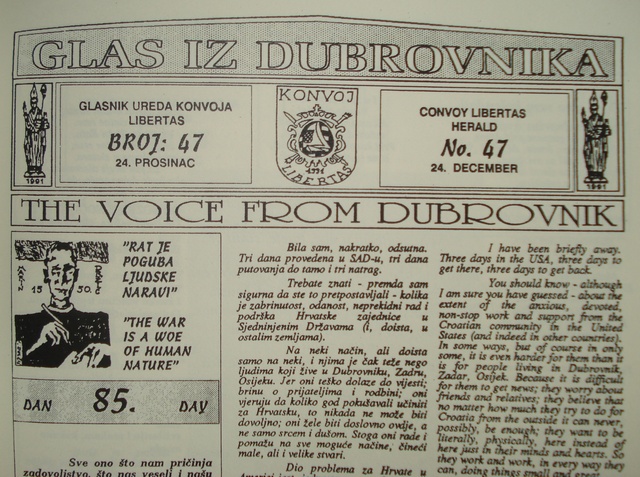
Part of the problem for the Croats in America is, simply, giving the true facts to the American public. Most Americans are not very good about European geography; they have a mental picture of "Europe" that contains, somewhere, Paris, Rome, Moscow, London, Zagreb - even Tel Avivi and Baghdad - and they would have difficulty in locating Bon or Belgrade on a map. (To illustrate this: during the Gulf war, the Philadelphia Symphony Orchestra cancelled a concert in LONDON because "Europe" was to dangerous; Saddam Hussein might drop Scud missiles on London and on them. By constrast: Zagreb Symphony Orchestra played in the ruins of Osijek Cathedral while the bombs realy did drop all around.) However, to be more fair to the Americans, you must admit that what we used to call "Yugoslavia" was never easy to understand.
Croatians in Washington and New York are of course anxious for every bit of news, however small, about life in Dubrovnik. So I wish I could have told them about the way that you, that the city, is preparing for Christmas! It is so impressive... whether it is the painted boards along Stradun, the performance on 22nd December in the Franciscan church, the Christams cribs...
"Normal" Christmasses are easy to forget. This one will not be! My greetings to you all.
K.V. Wilkes, 23rd December 1991.
1. siječnja [January] 1992.
Drage moje Dubrovkinje i Dubrovčani!
Iz dubine duše, sretno Novo ljeto. Svjetlo i voda su se vratili u Grad. Konvoji povratka se nastavljaju. Sve je veći broj dubrovačkih obitelji opet zajedno.
Dubrovnik je cijelog sebe ugradio u slobodnu i demokratsku Hrvatsku.
1991. godinu u Dubrovniku, pamtit ćemo kao godinu kada su oni rušili zidove, a mi rasli kao ljudi i stvarali Hrvatsku.
1992. godine, mnogo toga će biti pred nama.
Veliki dio Dubrovnika je i dalje okupiran, spaljen, kuće opljačkane, domovi srušeni; izgubiil smo najmilije; obitelji su razdvojene.
U 1992. moramo nastaviti oslobađati Dubrovnik, vraćati ljude, obnavljati razoreno i stvarati Hrvatsku.
Drage Dubrovkinje i Dubrovčani,
postali ste legenda hrvatske slobode i zbog toga imate obavezu lučonoša dostojanstva. Zato moramo:
- Obnoviti križ na Srđu i to odmah.
- 31.10. (ili na zadnju
nedjelju u listopadu), kada je Hrvatska
došla pomoći Dubrovniku, i 6.12. treba se popeti na Srđ
putem, koji se treba urediti kao križni put hrvatske slobode, s
postajama: Vukovar, Kostajnica, Topusko, Osijek...
Kipare i slikare iz tih godine pozivam da idejno riješe postaje križnoga put i dostave ih "Maloj braći". - Slike iz Dubrovnika
moraju postati knjige i film. U ovim zapisima
moramo sudjelovati svi mi koji smo to proživjeli.
Zati vas molim za suradnju.
Slobodan Lang
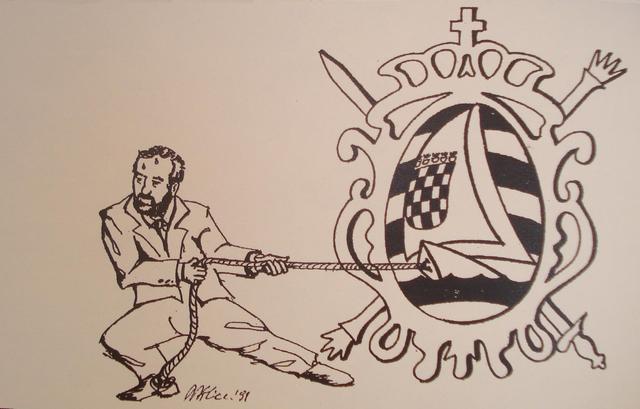
Published in Glas iz Dubrovnika / The Voice From Dubrovnik, 12.
prosinac [December] 1991.
3. siječanj [January] 1992.
I start this piece in a way that might seem unexpected; but be patient - I shall get to the point.
It can be argued, and has been argued, by Thomas Nagel, that technological progress makes it harder and harder not to be selfish. Selfishness is a matter of the time, energy, money, and power that one devotes to the satisfaction of one's own needs and desires in comparison with the amount of time (etc.) that one devotes to satisfying the needs and desires of others. In non-technological societies, a large proportion of one's time (etc.) must be devoted to one's own needs. Let us suppose, just for the sake the argument, that in such societies 50% of one's time must be spent on one's own basic necessities, so that 50% could be devoted to the needs and desires of others. But, as Marx pointed out, as technology advances we needs to spend less and less of our working lif to actually providing ourselves with food, clothes, and warmth.
Now: in highly-developed societies many people have an income twenty times as much as what is needed for their needs and desires. This means that such a person has earned enought to keep himself alive for a week by the time he is half way through Monday morning. So, supposing that - like the man in non-technological society - he devotes 50% of his resources to hmself, and 50% to others - then 5% of his activity is required for his own maintenance, so that 45% of his activity expresses a preference for superfluities for himself over subsistence for others. If one is responsible for evils that one knows about and can prevent without disproportional loss, then such selfishness is evil.
Now I come to the main point. Dubrovnik in the last few months has been anything but a "high technological society"! The struggle for warmth, food, clothes, even water has consumed at least as much time as it did in more primitive societies. So it seems to me that the other side of the coin has been well-illustrated here. Despite the fact that so much time and energy has had to go for the hunt for basic necessities, despite all that; I have never in my life experienced such self-denying altruism, such sharing, lending, giving - not only food, clothes, and other material necessities, but also of time: time to the Red Cross, to the refugees, to offices like CONVOY... well, you can all continue the list.
I am just about to return to Oxford (alas), which is at least a medium-technology society. So I hope that I can keep this lesson in the front of my mind; for which I shall always be grateful to you.
K.V. Wilkes
4. siječnja [January] 1991.
Dear friends,
This will be my last offering for the moment (unless the editors of GLAS IZ DUBROVNIKA [THE VOICE FROM DUBROVNIK] will accept an occasional comment faxed from Oxford). But I shall be back very soon - so this is not "goodbye", this is "ciao: see you soon".
I must return... because Oxford calls, and I have to remember that I have a "normal" life teaching students in Oxford. One of the many, many things that I have learned here is that it is importnat to retain as much normality as possible - to try to keep things going even as the bombs drop - so, in accordance with that lesson, I must always go back to my "normal" life.
Many people here have thanked me; I am not sure for what. I was here when I need not have been: true, but also true for thousands of you too. I have done some work: true, but that made the hard times easier, not more difficult - the difficult times were when one could do nothing, nothing, except listen to the bombs dropping.
So the thanks should go in the other direction. But if I started to thank you all for what you have done for me, I would need a small book. From material things (as I type this, I am wearing a scarf from Mokošica, a coat from Cavtat; my toothpaste, towels, and such things were given by friends here) to intangible things like the meaning - the real meaning - of friendship, of altruism, of courage.
I salute you all. Vidmo se [See you].
Kathy Wilkes
10 August 2006
(Reprinted by permission from Croatia Airline’s Inflight Magazine, Spring 2005)
BEYOND ALL FRONTIERS
By Majda Tafra-Vlahovic
The Inter-University Center Dubrovnik is an independent international institution and a source of knowledge and achievements. Since 1971, when the center was founded, over 55,000 participants, professors and students, have been involved in its work in more than 1300 post-graduate courses and scientific conferences.
It is more than certain that in the spring of 2005 some of the air passengers browsing through the pages of this issue of the Croatia Airlines Inflight magazine will be traveling to the institution which is the subject of this article, that is, to the IUC, as participants like to call it, or to the Inter-University Center in Dubrovnik, as it is officially called. One of the reasons this is certain is that the spring section of that institution´s calendar, like other items in this academic year, has long been filled with post graduate sessions and scientific conferences in a growing number of fields, in which scientists from many countries will participate. In 2004 alone, 60 courses and conferences with 1900 participants were held at the IUC.
Those who are on their way there probably know a lot about the Center, as participants call it for short, because it is a place to which many return, often starting out as students and later becoming directors of postgra-duate studies. But it is also likely that many other passengers and visitors to Croatia, and even some domestic travelers for whom Dubrovnik is a frequent destination, do not know enough about this rare pearl in the necklace that is Dubrovnik. That may be because this cultural sight in a city full of beautiful scenes which bring joy to the heart and soul, is not a building, a monument, a square, or a church • but a pure, unadulterated spiritual value worthy of Dubrovnik, a city which has been breathing the idea of freedom for centuries.
It is more than a home to new knowledge and discoveries, which are born of mutual meetings, discussions, reports • many of them subsequently collected in numerous books. Above all, there are particular persistent values which are a part of the atypical scientific activism characteristic of this institution, and a loyalty to the idea of the independence of science. The IUC is based in Dubrovnik, once a free and sovereign medieval city situated at the intersection of different cultural and political influences; and as the members will testify • they include 180 universities and scientific institutes around the world • it now continues the tradition of its past achievements in new, challenging circumstances. It maintains high standards of independent scientific activity, at the same time seeking opportunities for building bridges in the region of South-Eastern Europe where its special mission is to promote academic reform, with a commitment to pluralism within a wider academic environment.
The Inter-University Center in Dubrovnik is an independent international institution and a source of knowledge and achievement. Since 1971, when the center was founded, over 55,000 participants, teachers and students, have been involved in its work through more than 1300 post-graduate courses and scientific conferences. The idea of starting the center was born back in 1970 at a meeting of the International Association of Universities in Montreal. The proposal was made by Professor Ivan Supek, a scientist of global reputation, physicist, philosopher, novelist and dramatist, at the time serving as chancellor of the University of Zagreb (later president of the Croatian Academy of Arts and Sciences), and he argued that the international university community would benefit from this kind of inter-university cooperation beyond the control of the authorities. He offered the premises of the Center for Postgraduate Studies of the University of Zagreb located in Dubrovnik as the seat of this institution, and received substantial support. The next year, scientists and university leaders were invited to Dubrovnik where the IUC was founded and its statute adopted, and the official inauguration was arranged in 1972.
The IUC acted as a consortium of universities and other scientific institutions which paid their membership fees. From the very beginning, the University of Zagreb, whence the majority of students and a large number of professors came, was a generous host to the IUC, taking care of the premises, the infrastructure and a small local team. As far as academic issues were concerned, however, the University of Zagreb was on the same footing as the other member universities.
The city of Dubrovnik donated the building at Don Frane Bulić 4 street as the premises for the Center for Postgraduate Studies an early 20th century building which became a real home to the IUC in the early 70s thanks to the investment by the University of Zagreb. It has remained so until the present day, but the University had to invest in its reconstruction one more time, as it was destroyed by the Yugoslav Army during the Croatian Homeland War. In addition to certain other international programs, the IUC operates in the building of the Postgraduate Center of the University of Zagreb, where various postgraduate programs of the University of Zagreb take place. The beautiful building, with its court where for most of the year the participants gather during breaks and special events, has thrilled participants from around the world for years, and the proximity of the ancient city is a particular inspiration for social and scientific meetings. On the eve of the war against Croatia, in the early 90s, the IUC was at the height of its activity with many events and functions, literally overflowing with participants, so there were often events with insufficient space. But just as the IUC approached its maturity, marking twenty years of its existence, Dubrovnik was subjected to an aggression of unprecedented magnitude. The city, which ranks among the most valued cultural heritage protected by UNESCO, was attacked from sea and land, and the aggression culminated in the worst and most devastating attack on 6 December 1991, which included the destruction of the IUC building. Many cultural treasures of the medieval city of freedom were also destroyed, together with the Center as the seat of the spirit of free and independent science. The Center´s library was also burned down. At that time the executive secretary of the IUC Berta Dragičević and Professor Kathleen Wilkes, wrote a letter from the ruins of the wrecked building, which was in flames for days. Professor Wilkes was the president of the IUC´s Executive Committee and a British scholar from a well-known and influential family, who had stayed in the city under siege, hoping that her presence and her testimony would help the city and the Center. They wrote to their colleagues and friends around the world: In 1971, we had a dream: a project to unite the world in Dubrovnik. We started with 24 member university institutions and this dream became reality. Now, this dream has turned to ashes, not just metaphorically but literally. We need to start dreaming again, we now have the potential of our member institutions from the whole world and we believe they will share our dream.
And that is exactly what has happened. While Dubrovnik was overwhelmed with death and fear, and the university was left without a building and the IUC left without a home, the program continued, run from small premises on Stradun to which the Center´s office moved. That year, so-me of the programs were held in European cities to preserve the spirit of the Center, but in March and April two courses were held in Dubrovnik: Professor Wilkes´s course on the Philosophy of Science, and in April another course with a years-long tradition – The Future of Religion.
The courses were held at the Argentina Hotel, Dubrovnik´s only hotel open at the time, which was relatively safe, built into the ground so that shells could not endanger it, in a stone-walled hall with philodendrons and a terrace offering a spectacular view of Lokrum and Dubrovnik. The present writer was one of the four participants of the course on the future of religion, being a student attending lectures by no fewer than three professors. Professor Siebert arrived from America, bringing with him the photocopied materials for the seminar on a ship from Rijeka which was the only way to get to the city. We all stuck to the schedule and the IUC´s academic standards as if everything was normal, knowing that our symbolic gesture was helping the IUC and Dubrovnik to survive even the most difficult of trials.
During the period of twenty years before this war, Europe had been frozen in the cold war and there were many attempts and initiatives to establish cooperation and contacts in science and education. With the fall of the Berlin Wall, it became clear that this was indeed possible because the two worlds were not completely separated, and gradually the conditions for diverse cooperation were met. Until that point, it was the IUC that served as a bridge between the two worlds. For scientists from the former Eastern Bloc who were not allowed to go to the West, coming to Dubrovnik was the only possibility of meeting colleagues and experts from Western countries. In this, the IUC gained an enviable reputation among foreign universities, and for many Croatian students this was for years the only truly open window to the world and an opportunity to get acquainted with the trends in science and education at European and American universities and scientific institutions.
The Center remained an independent international scientific institution, for years supported by the considerable power of its 250 members, and this was a thorn in the side of many people in the rigid Yugoslav regime of that time. Reliable sources cited by Ørjar Øyen and Berta Dragičević in the publication issued on the occasion of the IUC´s 30th anniversary in 2002 claim that this extraordinary international phenomenon in the heart of Dubrovnik, which was probably a cause for concern because it was beyond the control of the authorities and the Communist Party, was once brought to the attention of Marshal Tito. Allegedly, Tito asked a prominent Party official to explain the matter to him, and when the official, who was familiar with the situation, described the IUC´s activities and its international reputation, Tito merely sent a brief message to the comrades in Croatia: Leave the IUC alone!
Thus, the IUC survived the years of Communist rule and the war, when the building was destroyed (it has been restored since the war) and many other difficulties. One of these is the constant defense of the independent status of this non-governmental institution, which is at its core a spiritual creation consisting of universities first and foremost, but also of its participants, the students and professors whose exceptional loyalty to the Center over the years is well known in Dubrovnik and among its many members.
Courses and conferences remain the key activity. Throughout three decades, a vast flow of enthusiasts created unusual and innovative scientific programs, many of which have veteran status and have been taking place for over thirty years, such as the above-mentioned Future of Religion or Philosophy of Science programs. One would need to mention hundreds of names of meritorious persons, but to avoid offending anyone, we shall mention, in addition to the spiritual father and visionary Ivan Supek, the longtime president of the Executive Board, the Norwegian professor Ørjar Øyen. The latter has been decorated by the Croatian President Stipe Mesić with the Order of the Star of Croatia with portrait of Ruđer Bošković, for his merits in promoting the international status and reputation of the Republic of Croatia through university and cultural cooperation, and also for his personal contribution to the affirmation and development of the IUC in Dubrovnik.
http://www.iuc.hr/news-item.php?id=20
Beyond Frontiers
30th Anniversary of Inter-University Centre Dubrovnik
Ørjar Øyen & Berta Dragičević
Dr. Kathy Wilkes, from Oxford, who chaired the IUC Executive Committee in this period, was in Dubrovnik when the whole thing started and stayed on with her friends, the people of Dubrovnik, and shared the ordeals with them - except for brief expeditions abroad, under difficult circumstances, mainly to seek help and assistance, medical resources - and even mine removal equipment. She dispatched to the world a number of reports from Dubrovnik. One of her many accounts, “Dubrovnik:
Lead upon Gold,” was published in Oxford Magazine in 1992. (In 1993, in recognition of her work, Kathy Wilkes became honorary citizen of Dubrovnik and in 2001 the University of Zagreb awarded her the honorary doctoral degree.)
On 16 December 1991, Kathy Wilkes and Berta Dragičević dispatched the following letter - it was published in Croatian and English in Glas iz Dubrovnika/The Voice from Dubrovnik:
You have been receiving several letters and appeals from our indefatigable Director-General, prof. Ørjar Øyen,
who has been working non-stop on behalf of Dubrovnik in general and the IUC in particular. We thought that
it would be time to write to you directly from Dubrovnik, to give you the news from the battlefield.
To start with what - since we are both functionaries of the IUC - concerns us most in that capacity: the IUC
building is destroyed, gutted, irreparable. Only the Secretariat itself was spared (and even there the roof might
fall in at any time); that gave us the opportunity to retrieve most of the documentation of the IUC’s 20-year history.
The building was still smouldering as we worked; along with other still-smouldering buildings, it was the
only warm place in Dubrovnik, where the temperature is around the freezing point.
We can, happily, tell you that all of those living there (some of our staff and refugees) were uninjured, although
they have of course lost the roof over their heads and all their possessions, and are deeply shocked.
We are determined that the IUC will rise again, and for that we shall need all your support. The Mayor of the
city and other authorities here, share that determination. At present the situation is still so uncertain, and so
much has been devastated, that it is evidently too early to talk of re-housing and re-establishing the IUC. But as
soon as possible, we hope to see discussions begin between our Director-General, the University of Zagreb, and
the Dubrovnik authorities for the renewal of IUC activities.
For we had a dream in 1971: the project of uniting the world in Dubrovnik. With twenty founder-member universities
we started and made it become true. This dream is now in ashes, not metaphorically but literally. We
now have to start dreaming again; now we have the potential of 240 member-institutions, we trust that we will
have as many of you as possible sharing this new dream.
We will not describe the destruction in the city and the Old City. You will have seen it on your televisions; and
it would make us heartsick to say more about it.
Our greetings from beautiful, devastated Dubrovnik.
Kathleen Wilkes
Chairman, Executive Committee
Berta Dragičević
Executive Secretary
I express my deep gratitude to prof. Alojzije Prosoli, Zagreb, for his permission to publish these articles. The whole collection of The Voice from Dubrovnik, containing many other interesting and important articles, is from his book [Prosoli], published in 1994 by Sveta Glazba/Musica Sacra, where one can see all the leaflets. Also many thanks to prof. Nada Bruer Ljubišić of the IUC, Dubrovnik, for sending me several rare photos of dr. Kathy Wilkes.
Kathleen Wilkes - report of the comission doctor honoris causa award of the University of Zagreb, Croatia
Kathy Wilkes Dr Honoris Causa of the University of Zagreb 2001
Slobodan Lang
Dubrovnik
Croatia - Overview of History, Culture, and Science
